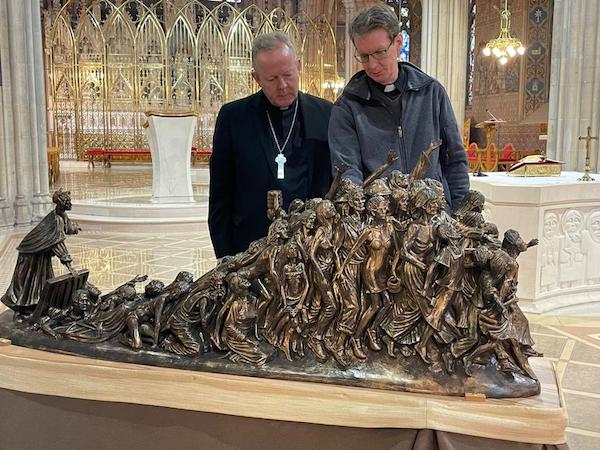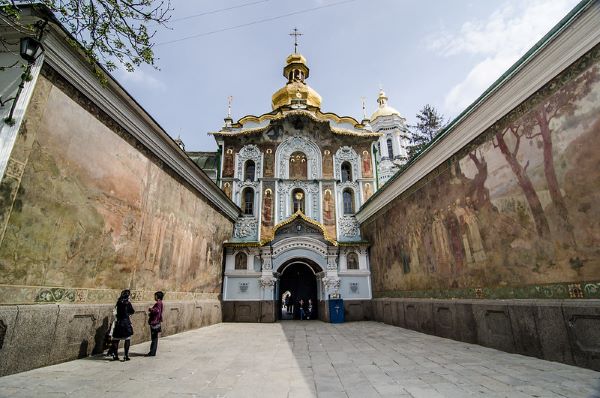Pope Francis has called for “respect” for religious sites in Ukraine, specifying a Moscow-linked monastery whose monks face eviction by the Kyiv authorities.
His remarks follow a request from Patriarch Kirill of Moscow to intervene on the monastery’s behalf.
Speaking at the end of his weekly general audience on Wednesday, Francis said that he was thinking of the Lavra monastery, known as the Monastery of the Caves, whose residents have been ordered to vacate it by 29 March.
“I ask the warring parties to respect religious sites,” said Francis. He mistakenly referred to the monastery’s “nuns” – the complex is inhabited by around 100 monks.
“Consecrated nuns, and consecrated people, be they of any denomination, are the support of the people of God,” he said.
The monastery’s residents belong to the Ukrainian Orthodox Church (UOC), which was historically loyal to the Moscow patriarchate but last year said it had cut all ties with Russia.
However, it remains divided from the Orthodox Church of Ukraine (OCU), which broke away as an autocephalous Church in 2018, and its clergy have been accused of collaboration with the invaders.
Kyiv introduced restrictions on the UOC’s activities in December, and has transferred parts of the 980-year-old Lavra monastery complex to the rival OCU.
On 10 March, the Ukrainian authorities ordered the UOC to leave the complex under the terms of a lease agreement. Jurisdiction over the site is disputed: it includes a state museum, and has historically been shared between Church and state.
The UOC said the eviction notice was “obviously biased and in gross violation of legal norms”.
In a further statement published on 13 March, the vicar of the monastery, Metropolitan Pavlo, said: “This is the property of the Church! It has been and will be. We are not against the state. We are for the state. But it can't be that way!”
He added: “We are not collaborators. We are citizens of our own state.”
In an appeal sent on 11 March to leaders of Churches – including the Pope and the Archbishop of Canterbury – and to international organisations, Patriarch Kirill asked them “to make every effort to prevent the forced closure of the monastery, which will lead to a violation of the rights of millions of Ukrainian believers to freedom of religion”.
He cited the Ukrainian constitution, the UN Charter and the Universal Declaration of Human Rights.
The President of Ukraine, Volodymyr Zelenksiy, defended the “movement to strengthen our spiritual independence” in a broadcast on 12 March.
“We will not allow a terrorist state to have any opportunity to manipulate the spirituality of our people, destroy Ukrainian shrines – our Lavras – or steal any valuables from them,” he said.
The Kyiv authorities have also ordered an audit of the contents of the Lavra monastery, which houses many relics and historic artefacts.
The Kremlin has condemned the “unprecedented and unacceptable decision”.
In a briefing on Monday, Vladimir Putin’s press secretary, Dmitry Peskov, said: “We consider this unacceptable and, of course, we believe that the international community should respond accordingly to such an outrageous decision.”
However, few international voices besides Pope Francis have commented on the events.
Lambeth Palace said on 20 March that Archbishop Justin Welby, who last week visited Ukrainian refugees in Romania, was following the situation and considering a suitable response.
A spokesperson told The Tablet that the archbishop had discussed the difficulties of the UOC with its leaders when he visited Kyiv in December.
“The archbishop continues to pray for all the churches of Ukraine as they struggle to resist the invasion and work for justice and peace.”
Amid these growing diplomatic pressures, Ukraine’s foreign minister has said that he does not count the Pope among his country’s allies and that God will judge his policy on Ukraine.
In an interview with the BBC published on Friday, Dmytro Kuleba said: “We deeply regret that the Pope has not found an opportunity to visit Ukraine since the beginning of the war.”
Francis has expressed his desire to travel to Ukraine but has said that he would only make the trip in conjunction with a visit to Moscow.
In an interview this week with EWTN, Archbishop Paul Gallagher, the Holy See’s secretary for relations with states, said there was “not much talk about the Holy Father going [to Ukraine] at the moment”.
Archbishop Gallagher described the Vatican’s role in maintaining contacts with both parties “to keep what I call the dream of peace alive”, but said that “there isn’t much space for dialogue and peace” in current circumstances.
“I don’t think, at the moment, anyone is really open to sincere dialogue in good faith,” he said.



 Loading ...
Loading ...